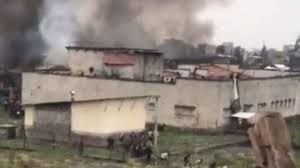In what has been termed a horrific report that has shocked the world, the United Nations has said that more than 100 women were raped and then burned alive after a jailbreak in the DRC.
The atrocities, described as “unspeakable acts of violence,” occurred in the aftermath of a mass prison escape in the eastern region of the country-an area long plagued by armed conflict and instability.
According to the UN, violence broke out when armed militants, presumed to be from the local rebel group, stormed into a prison in the town of Bunia, freeing dozens of inmates. After that chaotic moment, the fighters launched an offensive on the surrounding villages and terrorized the civilian population, attacking women and girls in what was described by UN officials as “a systematic campaign of terror.”.
“These acts are not only a violation of human rights but a crime against humanity,” UN spokesperson Michelle Bachelet said during a news conference. “The level of brutality is incomprehensible: women dragged out of their homes, horrifically sexually violated, and then burned alive. It is a stark reminder of the horrors that civilians in conflict zones face.”
The UN report has been condemned by international leaders and human rights organizations from around the world. The African Union called for an immediate investigation, while the European Union promised support for efforts to bring the perpetrators to justice. “The world cannot look on when such crimes are being committed,” EU Foreign Policy Chief Josep Borrell said. “We have to take action now to protect the most vulnerable and ensure that those responsible are held accountable.”
In an apparent vow against the attacks, the government called them “an affront to humanity.” That said, such rhetoric from senior officials has contrasted sharply with the meager response on the ground, argued critics, after yet another string of attacks recently shook the North Kivu region. Security for civilians hardly exists, activists say.
“The Congolese people want peace and deserve justice,” exclaimed local activist Jean-Pierre Mbelu, “but the atrocities will just go on so long as it’s only a symptom that has been treated.
It has sought to increase international support over the crisis in the DRC, facilitating funding toward humanitarian aid and peacekeeping. Survivors of such an attack remain to pick up the pieces and to deal with physical and emotional wounds from such violence.
As the world reacts to this tragic news, the incident serves as a grim reminder of the urgent need to protect civilians in conflict zones and to address the systemic issues that fuel such violence.
For the women of the DRC, the road to healing will be long—but the international community must not look away.
Source: BBC


Comments are closed.